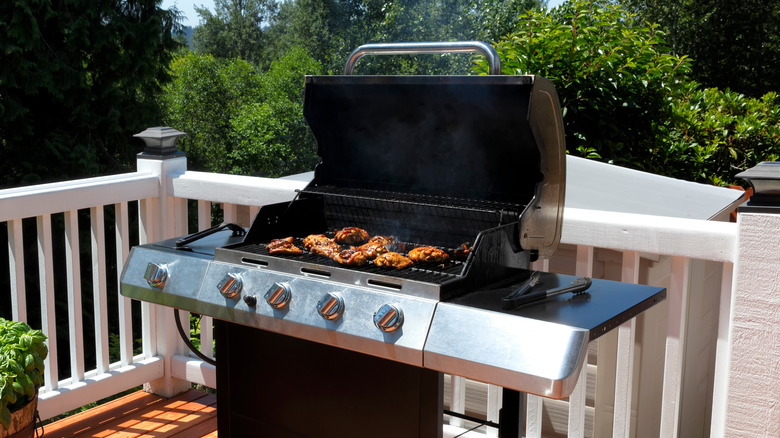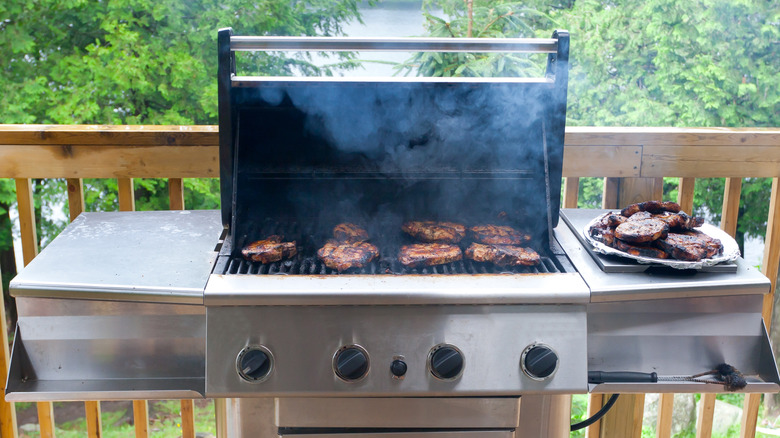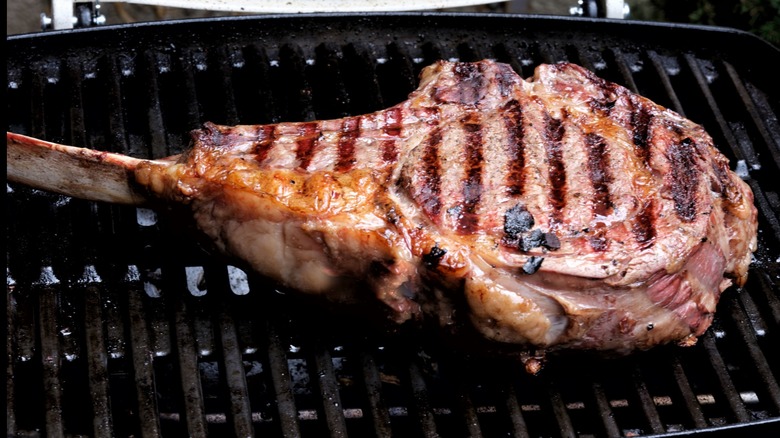Should You Keep The Lid Open Or Closed When Grilling?
Nothing beats the charred taste of freshly grilled food whether you're feeding a crowd or just cooking outdoors for yourself. But if your steak is taking much longer than anticipated, or your asparagus is overcooked, you might wonder whether it makes a big difference if you grill with the lid open or closed. The simple answer is: It depends on the type of grill — and on exactly what you're cooking.
With charcoal grills, you'll generally want to keep the lid closed, but you can open or close the vents while grilling for more precise control over temperature. With gas grills, which are not as hot as charcoal (500 to 700 degrees Fahrenheit on high versus 850 degrees), whether you have the lid open or closed will depend on the size of the food. Smaller items, like burgers, will cook quickly with the lid open whereas you should close it for thicker cuts of meat or anything that requires a low and slow approach.
Closing the lid means that the grill works in a very different way than it does when the lid is open. It traps heat, creating a convection, and essentially becomes more like an oven. Think about how you usually cook indoors, and apply the same logic. If it's food you'd ordinarily cook in a pan on the stove, then keep the lid open; if you'd normally cook it in the oven, then you can close the lid.
Sear thinner cuts of meat and vegetables with the lid open
As a general rule of thumb, if your food is less than ¾ of an inch thick, then you'll want to leave the lid open. With thinner cuts of steak and burgers, grilling them quickly over high heat with the lid open means you can get a well-seared outside while the interior remains juicy. It's why Bobby Flay's advice about using the grill lid centers around how long the food will take to cook.
It's the Maillard reaction, which occurs at 280 to 330 degrees Fahrenheit, that gives the beautifully caramelized crust you're looking for when grilling. Keeping the lid down for fast cooking at these temperatures would mean very thin pieces of protein could easily overcook in the center before they develop this delicious sear. If you're flipping regularly — and you should since it's a steak-flipping myth that you only need to do it once — it's also frustrating to have to keep opening and closing the lid each time.
The lid is also best left open for other smaller meats and fish that cook quickly, such as hot dogs, shrimp, kebabs, or thin pork chops. And the ¾ of an inch rule applies to vegetables, too. So for veggies that cook quickly, such as asparagus, peppers, or strips of zucchini, keep the lid open — this also means that the delicate flavor won't be dominated by an overly smoky taste.
Close the lid for whole chickens, thick cuts, and pizza
For food thicker than ¾ of an inch, it's best to close the grill lid, so it can cook more evenly in the heat from all directions. With thicker cuts of steak, such as New York strip — one of the best cuts of steak to grill, this method prevents the dreaded undercooked center yet burned exterior scenario.
Other meats that take more than half an hour should also be grilled with the lid down. This includes racks of ribs, brisket, or a leg of lamb — basically anything that requires longer cooking at a lower temperature. Close the lid when grilling your own rotisserie chicken, too, since a whole chicken takes around an hour. As well as getting a more pronounced smoky flavor from keeping the lid on, you'll also get more tender meat, as the enclosed chamber means it retains more moisture. Bring larger cuts of meat to room temperature before grilling to reduce the cooking time and achieve an evenly cooked result.
Besides meat, larger vegetables (such as whole cauliflower) will benefit from the lid being closed while grilling. And the lid is also vital when cooking pizza on a stone because indirect heat makes for a perfectly cooked center and crispy crust. Keeping the grill lid closed for four or five minutes while pizza cooks at a minimum of 550 degrees Fahrenheit will keep heat in and produce much more professional results.



